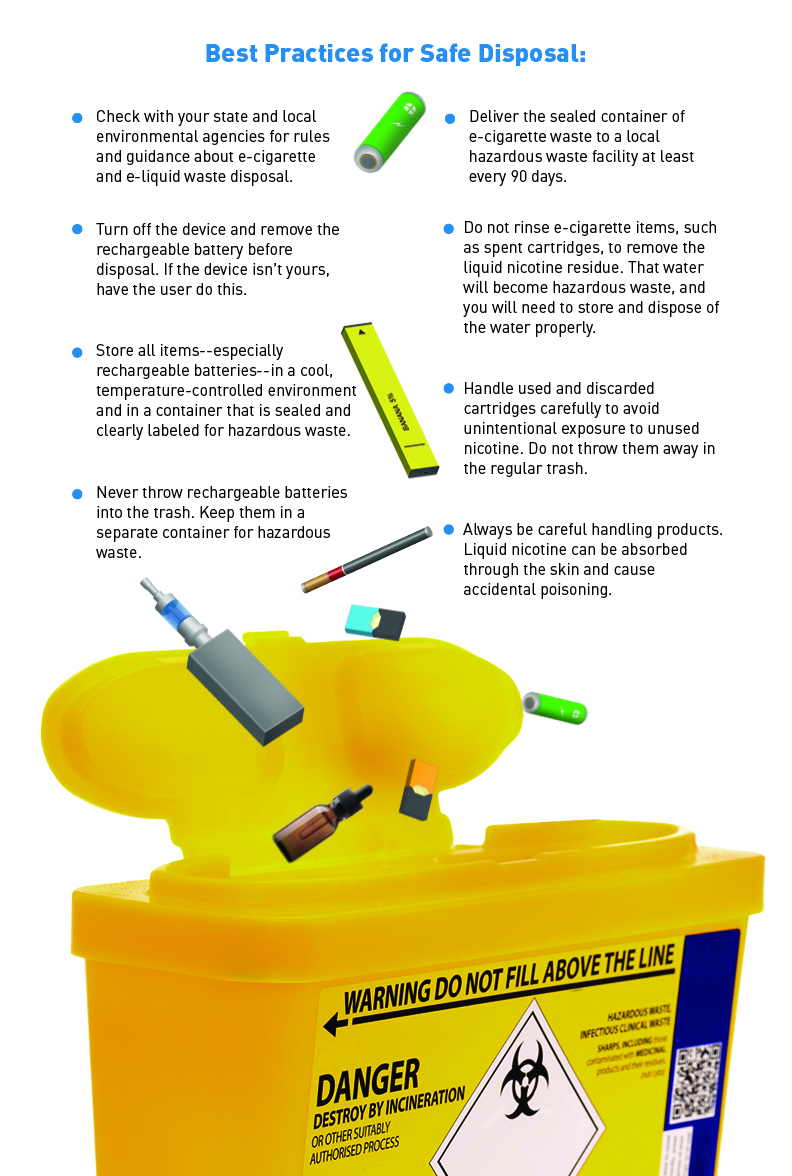Tips for Safe Disposal of E-Cigarettes and E-Liquid Waste
E-cigarettes, including rechargeable batteries and the cartridges and bottles that contain e-liquids (liquid nicotine mixtures), can pose a threat to human health and to the environment if they are not disposed of properly. E-cigarette and e-liquid waste should not be thrown in the regular trash or flushed down a sink. Instead, these items should be taken safely to a hazardous waste facility. The following are best practices and information compiled from state departments of health and public health nonprofit organizations.
Nicotine Is an Acute Hazardous Waste
Nicotine, including nicotine salt, is listed by the Environmental Protection Agency (EPA) as an acute hazardous waste. 1 Discarded or neglected vaping products may contain harmful substances, including unused e-liquid. 2, 3 Improper storage and disposal of these items may lead to unintentional exposure and accidental nicotine poisoning. Poison control centers receive thousands of calls per year about exposures to e-liquid, which can be fatal to small children involved in accidental exposures. 4, 5, 6
Improper disposal of e-cigarettes and e-liquid products can hurt the environment. If thrown in the trash or flushed into the sewer system, the nicotine solution in an e-liquid product can seep into the ground or water and become a danger for wildlife and humans. 3, 7, 8 As e-cigarette batteries degrade, the compounds in them can also seep into nearby water. Additionally, lithium ion batteries have been linked to explosions in recycling trucks when batteries are not properly disposed of. 9
Additional Information to Help Schools and Others
As sales of e-cigarettes have increased significantly in the past few years, institutions face a burden to dispose of e-cigarette waste in a way that protects human health and the environment. Schools face challenges both with confiscated e-cigarettes and with waste littered by students on school property. The most important step is to contact state and local environmental agencies to learn of specific guidelines. Please also review these additional resources:
- Disposing of E-Cigarette Waste: FAQ for Schools and Others:
https://www.publichealthlawcenter.org/sites/default/files/resources/Disposing-of-E-Cigarette-Waste-FAQ-for-Schools-and-Others.pdf - Minnesota Pollution Control Agency: Vaping Liquids, E-cigarettes and Nicotine Wastes:
https://www.pca.state.mn.us/sites/default/files/w-hw4-65.pdf - Colorado Department of Public Health & Environment: Vaping Liquids, E-cigarettes and Nicotine Wastes: Guidance for businesses, government agencies and schools handling nicotine-containing wastes:
https://environmentalrecords.colorado.gov/HPRMWebDrawerHM/RecordView/434101
1. EPA opinion letter on e-liquid as hazardous waste: https://rcrapublic.epa.gov/files/14850.pdf. Discarded or neglected vaping products may contain harmful substances, including unused e-liquid.
2. Krause MJ, Townsend TG. Hazardous waste status of discarded electronic cigarettes. Waste Manag. 2015;39:57-62.
3. Hendlin YH. Alert: Public health implications of electronic cigarette waste. American journal of public health. 2018;108(11):1489-1490. Improper storage and disposal of these items may lead to unintentional exposure and accidental nicotine poisoning. Poison control centers receive thousands of calls per year about exposures to e-liquid, which can be fatal to small children involved in accidental exposures.
4. Wang B, Liu S, Persoskie A. Poisoning exposure cases involving e-cigarettes and e-liquid in the United States, 2010-2018. Clin Toxicol (Phila). 2019:1-7.
5. Bassett RA, Osterhoudt K, Brabazon T. Nicotine poisoning in an infant. The New England journal of medicine. 2014;370(23):2249-2250.
6. Eggleston W, Nacca N, Stork CM, Marraffa JM. Pediatric death after unintentional exposure to liquid nicotine for an electronic cigarette. Clin Toxicol (Phila). 2016;54(9):890-891.
7. World Health Organization. Tobacco and Its Environmental Impact: An Overview. 2017. https://www.who.int/tobacco/publications/environmental-impact-overview/en/
8. Krause MJ, Townsend TG. Hazardous waste status of discarded electronic cigarettes. Waste Manag. 2015; 39:57-62. As e-cigarette batteries degrade, the compounds in them can also seep into nearby water. Additionally, lithium ion batteries have been linked to explosions in recycling trucks when batteries are not properly disposed of.
9. EPA presentation on lithium ion battery explosions in the solid waste system: https://www.epa.gov/sites/production/files/2018-03/documents/timpane_epa_li_slides312_ll_1.pdf


